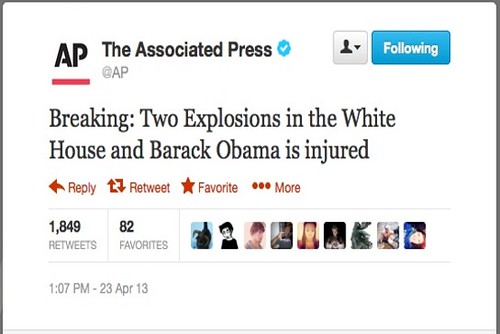I don’t use Twitter the way I use Facebook. Maybe because I’m old and came to social media late in the game? Whatever, for me Facebook is about friends and family while Twitter is about news and events. Facebook friends are people I know. I’ve never met the people I follow on Twitter and probably never will.
Who do I follow on Twitter? Journalists, bloggers, authors, experts in various fields. Through them I follow what’s going on in the world. The 300 or so people in my net have nets of their own; when they read something interesting they retweet it. In effect, then, I follow thousands.
Twitter’s great for breaking news and events. I learned about bin Laden’s capture and execution on Twitter a full twenty minutes before the first television news alerts. Ditto the latest events in Israel and Gaza, ditto the Malaysian airliner shot down over Ukraine. Twitter’s also good for getting the feel of how ongoing events affect people on the ground: through retweets I read first-hand reports from men and women on the street, soldiers, statesmen, refugees, protesters, counter-protesters … well, you get the idea.
You’re probably about to warn me that tweets from sources like these are rarely objective, that the “news” I get from Twitter is slanted, incomplete, partisan, propagandistic, sometimes intentionally false. Don’t worry, I’m aware of that. I’m also aware that the “news” we get from conventional media sources is likewise slanted, incomplete, partisan, propagandistic, sometimes intentionally false. I hope you know that as well.
I’ve found that Twitter, in addition to being a great heads-up source for events conventional news will soon be reporting, is helpful in filling in the gaps in conventional news reporting. Obviously you have to use your critical thinking skills when you’re reading tweets about fast-breaking events like the Israeli invasion of Gaza or the Malaysian Airlines shootdown, but you quickly develop a feel for what’s real and what is not. When you can’t tell, you step back.

Or take the current crisis in Israel and Gaza. So many tweets, from partisans on both sides, some quite hysterical. What is true and what is not? Israel says it went into Gaza to find and close tunnels used by Hamas terrorists. But according to several tweets posted by Gaza residents last night, the IDF also knocked down a geriatric hospital in Gaza. This clearly doesn’t square with official statements about the purpose of going into Gaza, but did it really happen? Remember the reports of invading Iraqis stealing baby incubators from hospitals in Kuwait during the lead up to Desert Storm? Those reports turned out to be bullshit, so I’ll remain skeptical until I learn more.
Early yesterday an NBC reporter delivered an emotional report about the bombing deaths of four Palestinian children whom he had been playing soccer with on a beach just moments before; later in the day, according to tweets from news industry insiders, NBC pulled that reporter and flew in Richard Engle to replace him. When I watched NBC news last night, there was Richard Engle … and no mention of the previous reporter being replaced. More info has come out on Twitter today; it’s said that NBC executives felt the previous reporter might get them in trouble with pro-Israel interests … call me a cynic, but this bit of background detail has the ring of truth.
Clearly there’s much more to the story than what is being reported by conventional news sources. Twitter … so long as I remember to take my daily grain of salt … helps me understand what’s really going on. Certainly I feel better informed than I would be if my only news sources were NPR and NBC.
The downside to Twitter is mob rule and public shaming. From the poor woman who lost her PR job for tweeting an insensitive joke about AIDS, to Michelle Shocked who tried to fight back as the Twitter tide turned against her (she is no longer on Twitter), to the multiple casualties of the Mia Farrow/Woody Allen wars, Twitter has claimed many a scalp. The place is a witch hunter’s paradise, a haven for trolls and racists. This is the chaff, though, not the wheat, and it’s easy enough to ignore … as long as you stay out of the various fights, which are sometimes good entertainment.
Now if I can just figure out how to say all this with 149 characters (including spaces) I’ll turn it into a Tweet.
Update (7/19/14): A friend read this via a Facebook link and commented that he wouldn’t trust many people to apply skepticism or critical thinking to what they read on Twitter, particularly with regard to emotional topics like Israel and Gaza. I agree. On Twitter, everyone immediately took either the Palestinian or Israeli side and then retreated behind ideological barricades. If you’re not following people on both sides you’re stuck in an epistemic bubble. In this case conventional news sources trump Twitter: on MSNBC last night, for example, Chris Hayes conducted a spirited interview with an Israeli spokesman; anyone watching would have gotten a much clearer view of where each side is coming from.
I try hard to avoid becoming epistemically isolated. I follow a few conservatives and libertarians (same thing IMO), even when they piss me off. The only people I block outright are the stupids and the racists (ditto); they have nothing to contribute and shouldn’t even have a seat at the table.